On 4 December 2020, Ethiopia submitted a Zero Draft resolution to the World Health Organization (WHO) on Strengthening Local Production of Medicines and Other Health Technologies to Improve Access – WHO Resolution on Strengthening Local Production of Medicines and Other Health Technologies to Improve Access.
In the words of Ethiopia, developing countries faced challenges in establishing robust local production facilities for medicines, vaccines, and other health technologies.
Progress has been made in promoting local production to benefit public health need, but there are still many challenges in strengthening local production towards quality assurance and sustainability to achieve this goal. Member States, especially LMICs, lack a holistic strategy, sufficient funding and human resources to support the development of local production. Policy incoherence and fragmented markets hamper the business environment from being conducive. Major barriers in quality and sustainable local production also include but not limited to: weak regulatory oversight; lack of skilled local workforce; lack of reliable market intelligence to inform investment decisions; no access to technology for transfer; lack of capacity to receive technology; difficulty in reaching and maintaining international quality standards; lack of sustainable and affordable financing mechanism to sustain local production.
Since December 2020, WHO member states have engaged in a series of negotiations in order to finalize the text of the local production resolution (sponsored by China, Eswatini, Ethiopia, Ghana, Kenya, Namibia, Rwanda, South Africa, Sudan, Togo and Zimbabwe). The most recent consultation was held on 26 March 2021; divisions still remain on language referring to intellectual property, TRIPS flexibilities, the WHO COVID-19 Technology Access Pool (C-TAP), and transparency. The next consultation will place on 13 April 2021.
Ethiopia’s concept note (December 2020) underscored the exigent need to scale local manufacturing capacity for medicines, vaccines and other health technologies in light of the challenges exacerbated by the COVID-19 pandemic.
The COVID-19 pandemic has presented an unprecedented challenge to health systems causing complete disruption of the global supply chain of vital medicines and other health products. Many countries imposed restrictive measures during the COVID-19 pandemic to secure adequate access to certain critical medicines and medical products. These restrictive measures including export restrictions, export authorization, restrictions on movement and lockdowns, especially in countries that are the largest producers, has resulted in significant market gaps in many vulnerable countries. The crisis underscored the risk of overreliance on international health supply chains, imported medicines and other health technologies and donor support.
The concept note traced the arc of local production discussions in international fora from the 1970s to the implementation of WHO’s Global Strategy and Plan of Action on Public Health, Innovation and Intellectual Property (GSPA-PHI).
Local production of medicines and other health technologies has been a subject of intense discussion in international, regional and national fora since the 1970s. Within the last two decades, there has been greater emphasis on issues of local production and related technology transfer in the context of access to medicines and other health technologies, leading to critical developments beginning with WHO Resolution WHA 61.21 on the Global Strategy and Plan of Action on Public Health, Innovation and Intellectual Property (GSPA-PHI). The GSPA-PHI is a landmark global strategy adopted in 2008 to improve treatment for poverty-related and neglected diseases disproportionately affecting developing countries by simultaneously stimulating innovation to find new medicines and other health technologies for these diseases and improving access to existing products. Element 3 of the GSPA-PHI highlights investment in building innovative capacity in key areas such as science and technology, and local production of pharmaceuticals. Element 4 emphasizes North-South and South-South development cooperation, partnerships and networks to facilitate transfer of technology related to health innovation.
Ethiopia signaled its objectives in submitting a draft resolution on local production.
Thus,the resolution is to call for a holistic, collaborative approach in addressing the current and future challenges in promoting sustainable local production to improve access to quality, safe, effective and affordable medicines and other health technologies.
The original text zero draft (4 December 2020) called for the WHO to assume a pro-active role in promoting technology transfer.
Operative paragraph 2(6) of the zero draft requested the WHO Director-General to “establish a global platform to promote need-based transfer of technology and local production under North-South and South-South cooperation”.
The current text (26 March 2021) has the following language:
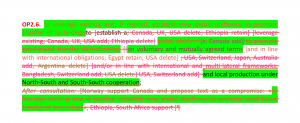
Operative paragraph 3(f) of the zero draft (4 December 2020) requested the the WHO Director-General to support “Member States in research and development and technology transfer for local production of prioritized medicines and other health technologies to address shortages and/or specific local public health needs”.
The current text (26 March 2021) has the following language:
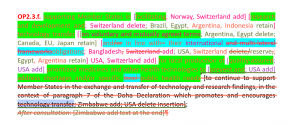
In the negotiations, Argentina proposed specific language on operative paragraph 2.8 bis on the transparency of prices and cost of medicines. The United States, however, proposed deletion of the word “cost”.
[OP 2.8 bis To continue to support transparency of prices and [economic data along the value chain; USA add;] [cost; USA delete] of medicines, including [locally-produced; USA add] medicines, [and other health technologies; USA add] (including the supply chain) in order to promote access and affordability; Argentina add] after consultation
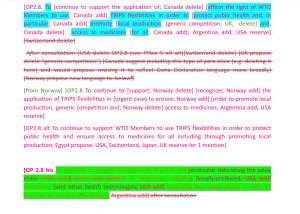
Ideological faultlines on the use of TRIPS flexibilities to facilitate local production have emerged in various parts of the text including the preamble and the operative sections directed at WHO member states and the WHO Director-General.
On 13 January 2021, the United Kingdom requested the deletion of “generic competition” in operative paragraph 2(8) asserting that “[g]eneric competition exists when IP rights have expired. TRIPS will only apply to existing IP rights.” Switzerland proposed deleting the first formulation of operative paragraph 2(8) in its entirety, while the United States added a reservation.
[OP2.8. To [continue to support the application of; Canada delete] [affirm the right of WTO Members to use; Canada add] TRIPS flexibilities in order to [protect public health and, in particular; Canada add] promote [local production, [generic competition; UK, delete] and; Canada delete] access to medicines [for all; Canada add]; Argentina add; USA reserve] [Switzerland delete]
Egypt proposed alternative TRIPS language for operative paragraph 2.8 (directed at WHO’s Director General). The United States, Switzerland, Japan, and the United Kingdom expressed reservations noting they wanted only one mention of TRIPS flexibilties in the local production resolution in the preamble.
[OP2.8 alt To continue to support WTO Members to use TRIPS flexibilities in order to protect public health and ensure access to medicines for all including through promoting local production; Egypt propose; USA, Switzerland, Japan, UK reserve for 1 mention]
The current wording in the preamble on TRIPS flexibilities reads as follows:
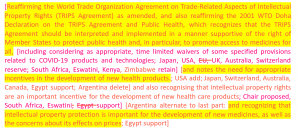
The preamble text reaffirms the language of the WTO Doha Declaration on the TRIPS Agreement and Public Health noting that the “TRIPS Agreement should be interpreted and implemented in a manner supportive of the right of Member States to protect public health and, in particular, to promote access to medicines for all”. The preamble contains specific language (in brackets) on “time limited waivers of some specified provisions related to COVID-19 products and technologies” supported by South Africa, Eswatini, Kenya, and Zimbabwe. Japan, United States, United Kingdom, Australia, and Switzerland expressed reservations on language referring to “time limited waivers”. Of interest to those following WTO discussions on a TRIPS waiver for COVID-19, the European Union originally expressed reservations on “time limited waivers” , but withdrew their objection (on 19 March 2021 according to the 26 March 2021 text).
Finally, preambular paragraph 8 contains bracketed language on voluntary initiatives including WHO’s COVID-19 Technology Access Pool (C-TAP) and the Medicines Patent Pool as mechanisms to build capacity for local production. The European Union proposed a reference to the Medicines Patent Pool supported by Canada and Brazil. Argentina proposed a specific reference to C-TAP supported by Costa Rica, Brazil, South Africa, Norway, Indonesia, and Kenya. Switzerland objected to its reference in the preamble. C-TAP is a voluntary mechanism to scale production, increase competition and speed the delivery of vaccines, therapeutics and other technologies. It is hard to fathom Switzerland’s reasoning in opposing voluntary efforts to scale production of COVID-19 vaccines.
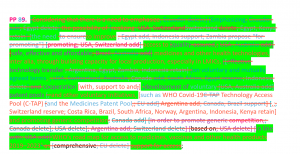
WHO member states are tasked with ironing out the remaining divergences in the local production resolution on 13 April 2021; a difficult road lies ahead.